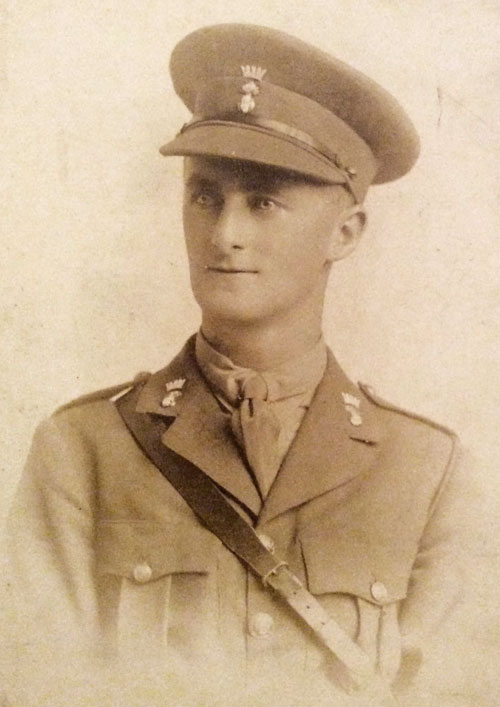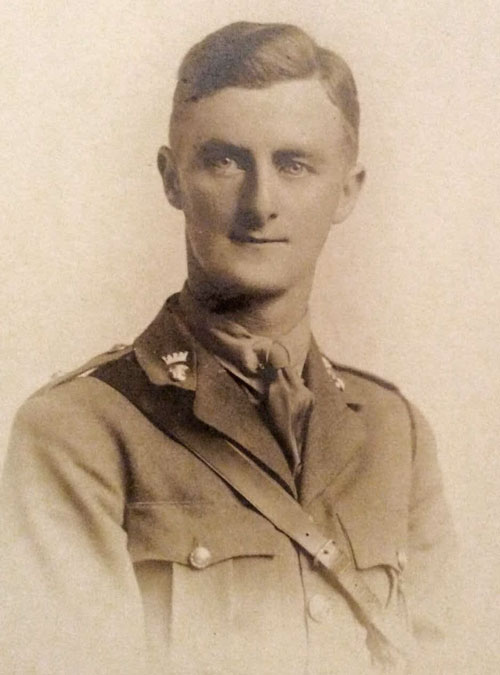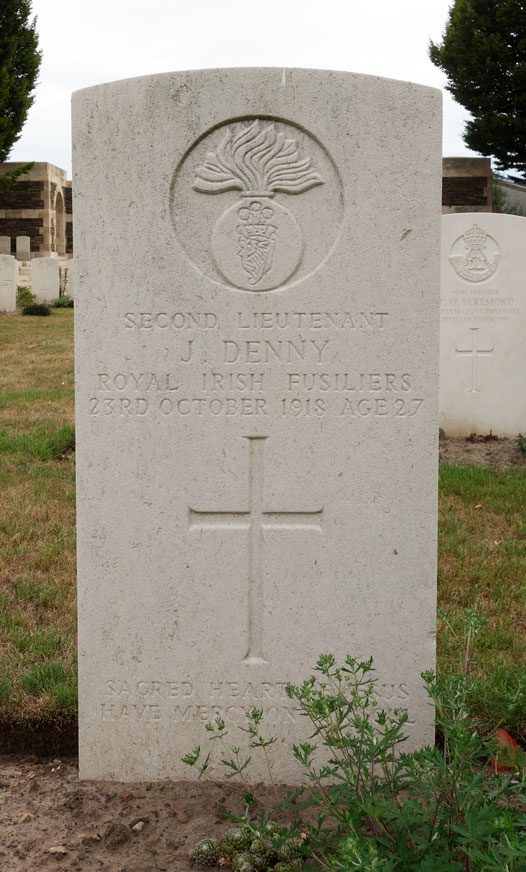![]() In memoriam
In memoriam ![]()
Second Lieutenant James Denny

James Denny was born on 30 May 1891 at 64 Fleet Street, Belfast, the third of ten children of labourer (later wine and spirit merchant) William Denny and his wife Mary (nee Walsh). Educated at a Belfast Christan Brothers school, by 1911 he was living with his family at 31 Hamilton Street and working as a clerk in a distillery.
Denny enlisted in the North Irish Horse at Antrim on 8 April 1915 (No.1479 – later Corps of Hussars No.71397). While in training at Antrim he had a number of brushes with authority. He was admonished and lost three days pay for being absent without leave from reveille on 12 June 1915 to 1.15 pm on 14 June; he was confined to camp for a week for being absent without leave from watchsetting on 30 June until 7.30 am the next day; and was confined to camp for a fortnight and lost five days pay for being absent without leave from watchsetting on 17 July until 10.30 pm on 21 July.
On 22 September 1915 he embarked for France, where he was posted to D Squadron.
In May 1916 D Squadron came together with A and E Squadrons of the North Irish Horse to form the 1st North Irish Horse Regiment, serving as corps cavalry to VII, XIX then V Corps from 1916 to 1918.
Denny was allowed ten days leave to the UK from 14 to 24 December 1916. He was promoted to lance corporal on 24 September 1917.
On 29 November 1917 he applied for a commission in the Royal Irish Rifles. The following month he left France, reporting for duty at No.7 Officer Cadet Battalion at Fermoy on 8 February 1918. He trained with moderate success. By June he was assessed as being an "average cadet", "has worked hard". His education and military knowledge were "fairly good" and his power of command and leadership "good". On 31 July 1918 he was commissioned as a 2nd lieutenant and posted to the 1st Battalion, Royal Irish Fusiliers.
Denny joined his battalion in the field in Belgium on 3 October 1918. Since August the 1st Battalion had seen much fighting during the Advance to Victory offensive. On 20 October they crossed the River Lys and were ordered to continue the advance. According to the 108 Brigade war diary of 23 October:
0800 The 1st.R.Ir.Fus. formed up on the road I.5.d., and I.6.a and advanced covered by a screen of scouts. ...
[By] 1200 [they] had advanced their line to the road at Engelhoek J.20.b. and J.21.c. without opposition.
1400 the enemy were found to be in occupation of Heirweg. A Coy of the 1st.R.Ir.Fus succeeded in clearing the enemy from the hamlet, but later they were counter-attacked by the enemy who succeeded in inflicting casualties and capturing a number of prisoners.
The battalion had lost one officer killed and one missing, and one other rank killed, seven wounded and 32 missing. 2nd Lieutenant Denny was the officer reported as killed, although he was subsequently reported as 'missing believed killed'. It was not until 6 December that his death was confirmed in a letter from the War Office to his family.
Denny's burial place was later located in the east of Heirweg (map ref. 29.J.16.d.2.8). Originally listed as an unknown British 2nd lieutenant of the Royal Irish Fusiliers, his identity was later confirmed. His body was exhumed and re-buried in the Harlebeke New British Cemetery, West-Vlaanderen, Belgium, grave VI.A.1. His gravestone inscription reads:
SECOND LIEUTENANT
J. DENNY
ROYAL IRISH FUSILIERS
23RD OCTOBER 1918 AGE 27
SACRED HEART OF JESUS
HAVE MERCY ON HIS SOUL

Gravestone image Copyright © Phillip Tardif with all rights reserved as set out in this Use of Material policy. Photographs of Denny sourced from Ancestry - contributor 'ewhyte81'.

